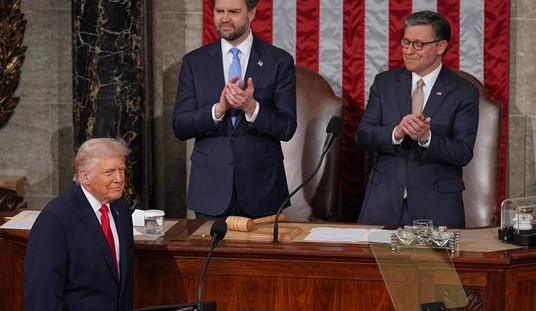The Republican fallback plan of the fallback plan to the fallback plan is ready to be put in motion. The latest fallback plan is to make interim speaker Rep. Patrick McHenry (R-N.C.) a sort of “quasi” speaker or “speaker in all but name” in order to unstick a half dozen pieces of legislation on aid to Israel and Ukraine and other legislation that can’t wait. McHenry and other members of Congress don’t believe that McHenry currently possesses the power to do that, so enabling legislation must be passed.
It’s a Constitutional gambit that the founders would have thought insane. But the founders never met any of these 21st-century Republicans. The GOP House members are going to simply declare that McHenry has certain powers even though they can’t be found in the Constitution. His powers will loosely be based on legislation passed after 9/11 and the failed al-Qaeda effort to fly a plane into the Capitol building.
But McHenry thinks his position as interim speaker only gives him the power to conduct the election for speaker of the House. It’s a very nebulous position for McHenry to be in, and he’s not even sure he wants the job.
And that’s only the start of Republicans’ problems in looking to go through with this plan. The scheme got a boost today when Speaker-wannabe Rep. Jim Jordan (R-Ohio) finally acknowledged the fact that too many Republican members hate him and would never vote to make him speaker. He threw in his lot with the group of Republicans who wanted to make McHenry interim speaker.
The rest of the GOP caucus is hardly convinced, and whoever is ramrodding this project is going to have to whip a lot of GOP votes for it to stand a chance. Almost certainly, at least some Democrats would have to sign off on making McHenry interim speaker. And that’s a problem for many Republicans.
Politico (emphasis in the original):
In fact, yesterday Jordan’s inner circle appeared to try to use this idea of empowering McHenry to boost Jordan’s own candidacy, accusing those flirting with the idea of trying to turn the majority over to Democrats.
— “It’s possible that today a small group of Republicans attempt to work with Democrats to build a coalition government,”warned Rep. WARREN DAVIDSON, an Ohio conservative helping Jordan whip votes. “I will gladly fight alongside the @HouseGOP to do what we said we would do, but I will surrender our agenda to no one.”
— Rep. THOMAS MASSIE (R-Ky.) quickly joined in, tweeting, “I agree. A majority is a terrible thing to waste. I will not vote to join a coalition with HAKEEM JEFFRIES. I will vote for Jim Jordan.”
Some Jordan backers want to bring the measure to empower McHenry to the floor immediately, hoping to defeat it and banish the idea for good. The reality is Jordan had a shot, and if any Republican is going to get a second look, it’s going to be former speaker Kevin McCarthy.
McCarthy lost by eight votes in his bid to stay in office. That’s closer than Scalise or Jordan have come. And McCarthy has built up an enormous amount of goodwill through his political action committee donating tens of millions of dollars to GOP members.
The empowering of McHenry is a longshot, especially if any significant number of Democratic votes would be necessary to pass it. But there’s one more Hail Mary pass the Republicans might try. Why can’t McHenry just start exercising the powers that members are talking about giving him?
BRENDAN BUCK, the former adviser to speakers JOHN BOEHNER and PAUL RYAN, endorses that strategy in a new NYT op-ed, noting that “in the absence of clear rules, the House operates on precedent.”
“We are in an unprecedented situation. And the House’s rules, functionally, are whatever a simple majority say they are,” he writes.
His pitch is interesting: A lawmaker should try to bring up a resolution condemning Hamas. McHenry, he writes, should recognize the person — and when someone objects, or the parliamentarian rules it out of order, the House could overrule that ruling.
“Mr. McHenry would be daring members of the House to block consideration of policy that most seem to badly want to support, and if they were successful, it could break the seal on the ability to legislate under a temporary speaker,” Buck writes.
Ideally, the House would put some kind of time limit on how long McHenry could exercise these extra-constitutional powers, and eventually, Republicans would be able to get their act together and elect a real speaker. But the longer the leadership crisis continues in the House, the more radical and insane some of the plans to address the crisis become.









Join the conversation as a VIP Member